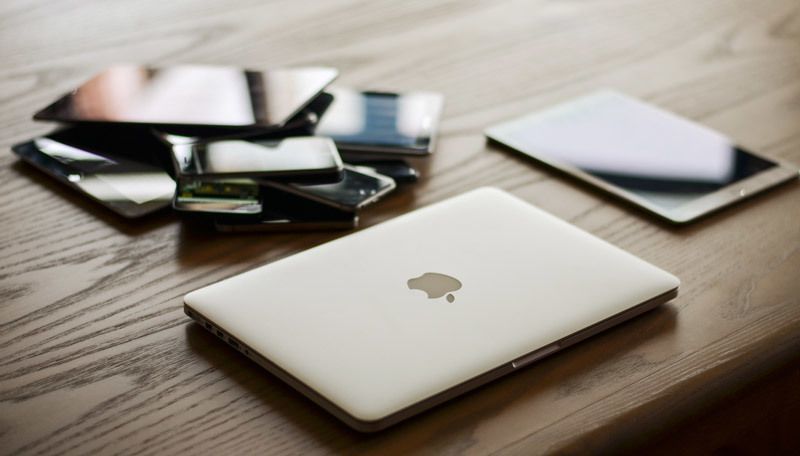
The second half of 2016 saw the ownership of wireless telephones or cellular phones exceeding for the first time that of landline telephones in American homes, according to the National Health Interview Survey. A 2019 Deloitte Insights report about 5G connectivity noted that an average household has 11 connected devices, seven of which are smart screens for viewing content.
Today's children are naturally exposed to technology's latest and greatest at a young age. They have computers and phones for traditional and online learning, in addition to gaming consoles, smartwatches, and "internet of devices" technology at home.
As you monitor your children's internet and cellphone habits, you also have to consider the devices that become obsolete, broken, beyond repair, or simply unwanted. Do you just throw these things out? Before tossing gadgets in the trash, consider the impact on the environment, which can become contaminated from chemicals found in discarded electronics. The safety and privacy of your children's data is another area of concern.
The information below shows you how to properly deal with gadgets and gizmos that children have outgrown.
How Do You Dispose of Old Gadgets?
1. Gather all unwanted and unused tech gadgets in one place
- Cell phones
- Computers
- Monitors
- Wearables
- Gaming consoles
- Educational toys
Recycling programs and companies have different guidelines on electronics they accept. Some items can go for sale, donation, etc.
For this gadget-disposal guide, the focus will be more on computers, smartphones, and related accessories.
2. Prepare gadgets for proper disposal
- Save files to the cloud or to a physical storage media. Ensure that no one outside your family has access to the files.
- Log out of all accounts, be they for school, social media, and others.
- Clear browsing history.
- Uninstall programs.
- Reset PC (instructions can vary by the operating system).
- Wipe the hard disk clean of all personal data. Professional data-wiping services sanitize hard disks to ensure data is protected and irretrievable.
Smartphones
- Back up files and move them to cloud or physical storage.
- Delete all pictures, text messages, phone contacts, notes, and any traces of identification.
- Uninstall apps, such as anonymous messaging apps that may be a venue for cyberbullying, harassment, and threats.
- Restore Android phones and iPhones (iPads and iPods, too) to factory settings. As an extra step prior to the reset, encrypt your phone first.
Memory sticks, external drives, SD cards
- Create a backup for data.
- Delete files.
- Format.
- Encrypt. Data encryption for hard disk drives also works with portable drives.
Batteries
Take them out of each device. Batteries and devices are recycled separately.
3. Trade in or sell
Not all used things have resale value, but you can try finding buyers in online classifieds and marketplaces. For example, nostalgia has fueled the demand for 80s-looking or vintage hand-held toys.
For the more modern devices, you can trade them in for cash or gift cards. Selling them yourself may generate more money. Here are some quick tips for pricing electronics right:
- Phones are quicker to sell, but you need to act fast because new models are being released all the time.
- For laptops, take note of the brand, model, and specs. Look up similar products online and compare prices. Someone knowledgeable about computers may help you set a price for it.
- Be honest about the product's condition and the reason for selling. List its important features and specs.
4. Donate
Some used electronics can receive a new lease on life through fresh batteries and slight repairs. They will be better off with new owners who can use them for learning and skills development.
You may want to consider partnering with neighbors or others and organize a donation drive in your community. Enlist the participation of fellow parents, co-workers, or friends to pool used computers, chargers, printers, and other hardware in reasonable condition.
Consider donating what you collected to organizations that work with children, families, and schools to provide equal access to technology.
Here are a few examples.
- Computers for Kids donates and distributes computer systems to schools and K-14 students.
- Computers 2 Kids, San Diego, delivers computers to children and families in the community, from individual and corporate donors.
- Kids on Computers sets up computer laboratories for learning subjects that don't need internet access in low-income schools.
- RRRcomputer.org accepts computer or cash donations to provide students with computers for distance learning.
- Computer Reach works with nonprofit organizations to provide hardware and support to schools in low-income communities.
In light of the COVID-19 pandemic, gathering support or donations through social media can be very effective. Create a campaign with an official hashtag, coordinate pickup events, and keep everyone up to date.
Confirm with the organizations about their refurbishing/recycling procedures, but make sure to wipe your devices clean inside and outside.
In Massachusetts, check Beyond The Bin and Donation Town to find places nearby that will accept used electronics.
5. Recycle
Recycling electronics means recovering valuable materials and processing the components in an environmentally friendly, safe way. When you recycle laptops and phones, you help save energy and other resources.
With the devices clean and ready, it's time to send them off for recycling:
Remove the batteries, one of the four types of universal waste. Drop them in battery collection bins.
Contact your state or local recycling programs or visit Call2Recycle for more information about battery recycling.
Check with the manufacturers and retailers for take-back programs, which can have fees or be free of charge.
Find an e-steward or recycler. When choosing a recycler, look into its e-waste recycling process, particularly data destruction services.
Editor's Note: A slightly different version of this blog was originally posted by PC Liquidations.
References
- Binns, C. (2018, November 23). The e-waste nightmare lurking in your kid's toy box. https://mashable.com/article/toys-ewaste-batteries/.
- Environmental Protection Agency. (n.d.). Electronics Donation and Recycling. https://www.epa.gov/recycle/electronics-donation-and-recycling.
- MIT News. (2003, January 29). Grad Students Uncover Mountains of Private Data on Discarded Hard Drives. https://news.mit.edu/2003/diskdrives-0129.
- Patchin, J. W. (2015, December 21). The Secret to Safety on Anonymous Apps. Cyberbullying Research Center. https://cyberbullying.org/the-secret-to-safety-on-anonymous-apps .
- UC Santa Cruz. (last modified: 2019, April 5). Battery Recycling FAQs. https://ehs.ucsc.edu/programs/waste-management/recycling-disposal/batteries-faq.html.
- Westcott, K., Loucks, J., Littmann, D., Wilson, P., Srivastava S., & Ciampa, D. (2019). Build It and They Will Embrace It. The Deloitte Center for Technology, Media & Telecommunications https://www2.deloitte.com/content/dam/insights/us/articles/6457_Mobile-trends-survey/DI_Build-it-and-they-will-embrace-it.pdf.


